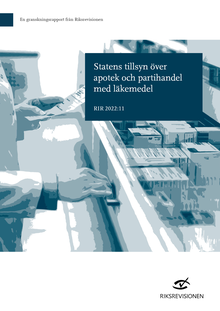Confidentiality rules prevent efficient supervision of pharmacies and wholesalers
Central government supervision of trade in medicinal products must protect human life and health, and ensure that the pharmaceutical subsidies are used correctly. The Swedish National Audit Office audit shows that supervision is not efficient because the agencies responsible cannot share important information with each other.

Photo: Caiaimage
Central government carries out supervision of the trade in medicinal products to ensure that the right person receives the right medicine in the right dosage, that patients receive sound advice and that narcotic drugs and other desirable medicines do not fall into the wrong hands.
Three government agencies are responsible for supervision: the Medical Products Agency, the Health and Care Inspectorate (IVO) and the Dental and Pharmaceutical Benefits Agency (TLV). In addition, the Swedish eHealth Agency plays an important role as it collects large amounts of data on dispensation and sales of medicinal products.
The Swedish National Audit Office (Swedish NAO) has audited whether supervision of the trade in medicinal products is effective. The audit shows that there are major deficiencies, mainly because the secrecy legislation does not permit the agencies responsible to share important information with each other.
“Supervision needs to be more efficient. If the government agencies were allowed to access the statistics collected by the Swedish eHealth Agency, they would have much greater opportunities to focus supervision on problem areas. Now they are obliged to rely on reports and tips,” says Auditor General Helena Lindberg.
Since the supervisory authorities are responsible for different, sometimes overlapping, sections of the trade in medicinal products, supervision would benefit from close cooperation. However, even here the secrecy regulations constitute an obstacle.
“With access to the Swedish eHealth Agency’s data and expanded opportunities to share information with each other, the supervisory authorities could, for example, identify pharmacies with irregular dispensation of narcotic substances and growth hormones,” says Ulf Andersson, Project Leader of the audit.
In 2019, the government agencies proposed that Government supplement legislation with provisions overriding secrecy to allow agencies to share information with each other. The Government has not taken any measures to achieve this.
“This leads to poorer patient safety and misuse of the State’s and regions’ funds, since the pharmaceutical reimbursement system and other subsidies of medicines can be exploited by unscrupulous actors,” says Helena Lindberg.
Apart from these deficiencies, the Swedish NAO notes that the Medical Products Agency needs to be better at ensuring that pharmacies address the shortcomings identified by supervision.
In addition, a new regulation is needed to prevent pharmacies from overcharging for special dietary foods for children and medicinal products not covered by the pharmaceutical reimbursement system.
Recommendations in brief
The recommendations to the Government include:
- introduce an opportunity for supervisory authorities to share information if needed for the receiving agency’s pharmacy supervision
- introduce an expanded obligation for the Swedish eHealth Agency to submit data to the Medical Products Agency and IVO on pharmacies’ dispensation and wholesalers’ sales
- give TLV access to additional information from the Swedish eHealth Agency
- introduce regulations that prevent pharmacies from overcharging for special dietary foods for children and medicinal products not covered by the pharmaceutical reimbursement system but subsidised by the State or by the regions.
It is recommended that the Medical Products Agency monitor that pharmacies follow the Medical Products Agency’s supervisory decisions.
See the report for full recommendations.
Press contact: Olle Castelius, phone: +46 8-5171 40 04.
Presskontakt: Olle Castelius , telefon: 08-5171 42 06.
Share in social media and by e-mail
Contact form
Send your questions or comments via the form below and we will make sure that they reach the right member of staff. Please state if your question concerns the information on this particular page.


